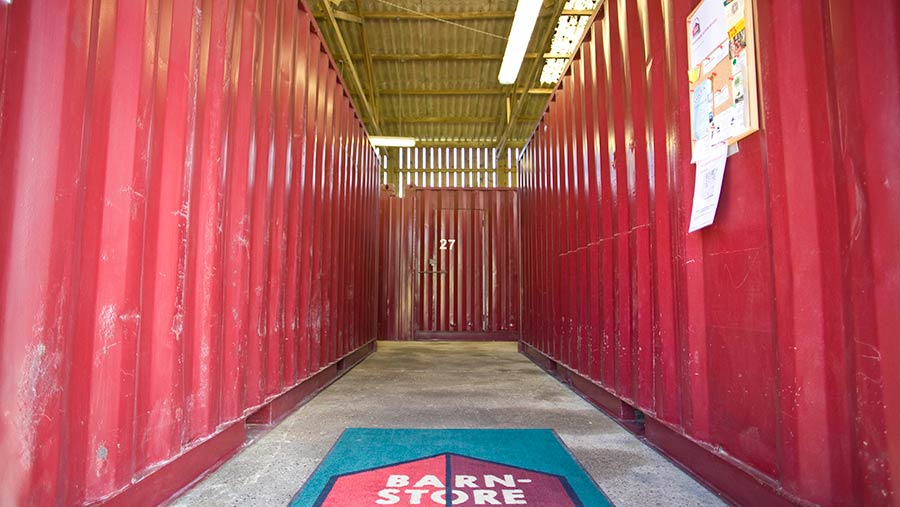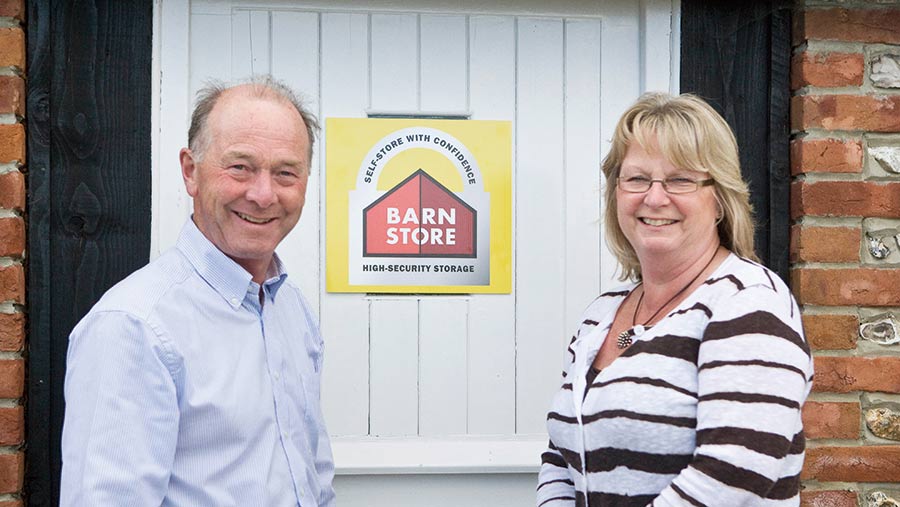So you want to… offer self-storage on farm?
 © Michel Focard
© Michel Focard People need storage for all sorts of reasons at different points in their lives. Farmers Weekly looks at the growing market for self-storage and the opportunity it offers farmers. We spoke to four experts to explain what renting out storage entails.
Self-storage facts
- A large and growing market with a turnover of more than £540m a year
- The Self-Storage Association estimates that there are more than 1,430 sites across the UK
- More than 300 sites offer mainly container storage
- Average occupancy rate in 2017 was 75.8%, slightly higher than in the previous year
- Income averaged £22.68/sq ft in 2017
- London net rental rates are double those of the East Midlands or the North
- More than 70% of self-storage users live within 20 minutes of their unit
Is planning permission needed?
As for any change of use from agriculture, planning will be an issue. Traffic and access are likely to be the main considerations.
The planning process should take about eight weeks from submission of the application.
Small-scale operations (up to 500m²) may be carried out under permitted development rights, although these cover only the change of use and no building works.
Permission for containers in yards is harder to get and in the green belt almost impossible. Such ventures would not be subject to any permitted development.
Brian Barrow, managing director of consultancy Acorus
See also: More diversification advice
Tax
The tax implications of changing the use of buildings can be significant and long-term.
Different elements of expenditure attract different rates of relief – get a detailed quote and invoices so that relief can be properly allocated.
The first £200,000 of expenditure on plant and machinery and integral features attracts tax relief at 100% a year for each business. Containers could qualify as plant and machinery but take advice on this.
After this, an 18% writing down allowance can be claimed for plant and 8% for integral features.
VAT must be charged on the storage or rental fees.
A change of use can affect the inheritance tax (IHT) position. Non-agricultural use means the assets may not qualify for agricultural property relief (100% relief) from IHT, but might attract business property relief, also at up to 100%.
Such ventures are often run as part of the main farming business, but it is important to cost them separately.
Consider whether a separate business structure should be used, for example a separate company, sole trader or partnership.
The impact on any potential capital gains tax liability and reliefs should also be considered.
Mark Chatterton, director of accountant Duncan & Toplis
Legal risks and obligations
In some cases gas safety certification and regular electrical and health and safety checks will be needed.
Even if the storage building doesn’t have any, asbestos in a building nearby could be an issue for users of the storage facility. Check for the presence and state of any asbestos to see if action needs to be taken.
If the storage building has been used as security for borrowing, the lender’s consent to the venture will be needed.
If the farm is subject to clawback (sale conditions which arrange for a proportion of the uplift in value caused by a non-agricultural use, or grant of planning permission for that use, being passed back to a previous owner) this may be triggered by the change of use.
Tenant farmers thinking of self-storage will almost certainly need the consent of their landlord, usually through a licence to sublet.
If the lease is a sub-lease, the landlord may ask for a share of the storage income.
Such a lease/sublease should ensure the correct procedure is followed to “contract out” of the Landlord and Tenant Act 1954, otherwise they may unwittingly grant the occupier of the unit the right to renew the tenancy at the end of the agreed term, making it much more difficult to get rid of them.
Diversification income can jeopardise tenancy succession on a traditional tenancy. This is a complex area and needs expert advice at the outset.
Check whether the farm tenancy contains any restrictive covenants – for example, it is not unusual to see “agricultural and equestrian use” only conditions and this may preclude diversification, at least without consent.
If works are needed to convert a tenanted building, a licence for those works may be needed and the landlord may require reinstatement at the end of the tenancy.
Sian Edmunds, partner in law firm Burges Salmon
Insurance considerations
Any farmer diversifying must inform their insurer of the new venture and review cover.
Farm policies cover only for the business of farming, so any non-agricultural venture can leave a business very exposed.
For a self-storage business, public liability cover needs to be reviewed because of the risk posed by the new activity and the increased traffic and pedestrian movement it will bring. Trips, slips and falls are common claim areas.
Cover levels in this area should take account of changes in the Ogden rate (a recent review of the sums awarded for injury) and increases in potential compensation payments for serious injuries.
Farm policies often have standard £10m limits each for public and product liability, but some insurers are advising these are doubled following the recent review.
It should be a condition of the storage agreement that customers are responsible for insuring their own stored property.
Charles Foster, chief executive, insurance broker Lycetts
Tips for offering storage
- Research your market carefully
- Visit the competition – what do they offer, what do they charge?
- Know your local population – what will people want/expect?
- Make customers feel comfortable and confident about the place, don’t hurry them
- Understand that people needing storage are often at a difficult point in their lives, stressed by a house move, possibly downsizing, grieving or going through some other family trauma, such as divorce
- The ideal site is fairly close to a large population centre, has good road frontage, good access and, ideally, can be seen from the road
- Don’t take your eye off the ball, keep standards up, the business will not run itself
- A good tight contract is essential, it must not be over-complicated but should include a customer declaration that they are not bringing anything illegal or dangerous onto the site
- Have a secure payment method and try to avoid cash
Case study
Martin Bazeley started his self-storage business in 2003 on the farm he rents from the Southwick Estate near Fareham in Hampshire.
This is his second major diversification, alongside a successful brewery business, Suthwyk Ales, also run from Offwell Farm.
Farm facts
- 350ha tenanted farm
- Mainly combinable crops
- 230-cow dairy herd
- Diversified into container self-storage storage and ales brewed using the farm’s own malting barley and hops
- Storage capacity 14,000 sq ft in 140 units, all indoors, all ground level
- Unit sizes from 40 sq ft to 320sq ft, all containers, some subdivided to make smaller stores
Development of the storage business followed the merger of the farm’s two dairy herds, which left under-utilised buildings. As machinery grew in size, more 1960s and 1970s buildings became less suitable for their original use.
Unlike many container-based storage sites, all of the Barn Store units are indoors, in squeaky clean and well-lit buildings in which the farm’s landlord has invested to convert and upgrade them.
The business takes about £140,000 a year in storage rental fees and is profitable, with a percentage of the rental income going to the landlord.
The storage buildings have been taken out of the farm tenancy, leading to a slight drop in the farm rent.
Mr Bazeley was clear from the start that he wanted this to be a top-end venture, which looked after and understood its customers, who can access stores at any time using a personal electronic fob.
Cleanliness and security are high priority, including alarms and constant CCTV monitoring.
As a result, prices are at the higher end of the range with a 40sq ft space costing £90 a month and the 160 sq ft units £290 a month.
This is more than double the rate of many outside units but still well below the purpose-built self-storage units seen on industrial estates.
“Although we’re close to a big population centre (Portsmouth), relatively little of our trade comes from the city. People will drive a considerable distance for the right storage.
“The business is a good fit with farming, as long as you don’t mind the public and can be flexible,” says Mr Bazeley.
“After office hours the business telephone numbers are diverted to our private numbers.”
The storage and farm businesses are one, sharing a VAT number, but are costed separately. Payment is by direct debit and, unlike some storage sites, charges are clearly shown on the website.

The most challenging aspect of starting the storage business was that it was a leap into the unknown in terms of customer service and marketing, says Mr Bazeley.
“You need to own what you are offering and understand your customer. The first time someone comes to look at the storage, you might need to spend 20 to 30 minutes showing them around and talking with them so that they feel comfortable, that’s all part of it.”
The success of his own Barn Store business has prompted Mr Bazeley to diversify in a very unusual way, franchising the Barn Store model to 12 other farms as far north as Staffordshire, west to Herefordshire, south-west to Somerset and eastwards to Kent. More new stores are to open soon.
The brand relies on the same high level of service and storage at all locations, where the owners also all live on site.
Mr Bazeley’s sister Jane works full-time for the storage business, while his daughters Emma and Naomi work part-time for Barn Store and Suthwyk Ales.
